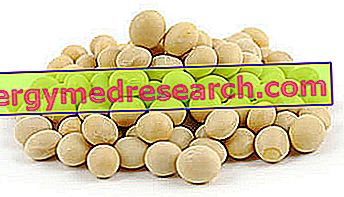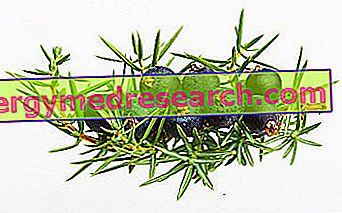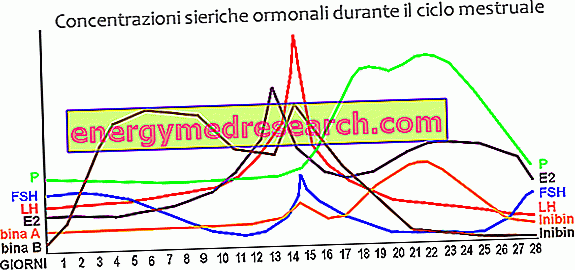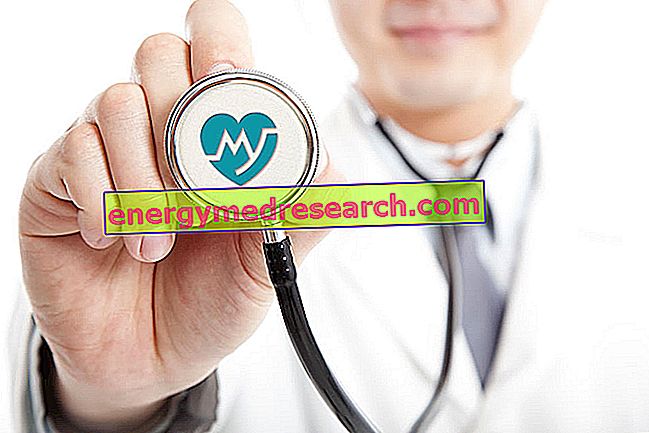What are
Soy proteins are obtained from the seeds of the homonymous leguminous plant, which boast an excellent protein content, equal to about 37% of the dry weight.
These are very high percentages, much higher than those of meat and fish, which contain about 20-25 grams of protein for each ounce of product.
Protein quality
In addition to the quantitative aspect, it is however known that soy proteins are of lower quality than animal ones; in fact, methionine is scarce among their amino acids, and this negatively affects the use of other amino acids in protein synthesis.

Protein quality of soy protein isolate
At this point it is important to point out that the quality of isolated soy proteins is higher than that of the proteins obtained by ingesting the whole seed or soy-based foods.
Thanks to the high content of glutamine, arginine and branched amino acids, as well as the extraction and processing methods, the isolated soy proteins recorded the highest protein quality score in the new index developed by the World Health Organization.
We are talking about PDCAAS, which takes into account both the amino acid content and its digestibility to establish the quality of a protein source. The maximum PDCAAS score is 1.0, so all proteins with a score of 1.0 are considered complete for humans. As anticipated, the isolated proteins of the soy, together with the casein, to the proteins of the whey (Whey) and those of the egg, have totaled a perfect 1, 0; beef, on the other hand, totaled only 0.92, closely followed by soybeans with a score of 0.91.
Below is the amino acid composition of various protein supplements, so as to obtain an immediate comparison between soy proteins and whey and egg proteins; it should be noted that the sum of the individual amino acids does not coincide perfectly with the total protein content (due to technical flaws that can be found in practically all the cards of the producers).
Amino acid profile | SOYA PROTEIN * | MILK SERUM PROTEINS ^ | MILK SERUM PROTEINS ° | EGG PROTEINS * |
| g / 100 g | g / 100 g | g / 100 g | g / 100 g | |
| Protein | 90 | 80 | 90.5 | 76 |
Aspartic acid | 10, 35 | 8.8 | 10.1 | 6.67 |
Glutamic acid | 17, 28 | 14.5 | 14.2 | 8.71 |
Alanine | 3.87 | 4.0 | 4.6 | 3.79 |
Arginine | 6.75 | 1.7 | 2.4 | 3.57 |
Cysteine | 1.08 | 1.8 | 3.2 | 1.69 |
Phenylalanine | 4.68 | 2.4 | 3.1 | 3.83 |
Glycine | 3.69 | 3.4 | 1.5 | 2.30 |
isoleucine | 4.32 | 5.1 | 5.1 | 3.71 |
Histidine | 2.43 | 1.4 | 1.6 | 1.48 |
Leucine | 7.2 | 8.5 | 11.5 | 5.53 |
Lysine | 5.67 | 7.7 | 9.0 | 4.47 |
Methionine | 1.26 | 1.6 | 1.9 | 2.26 |
Proline | 4.68 | 4.4 | 3.6 | 2.5 |
Serina | 4.95 | 3.7 | 3.6 | 4.52 |
Tyrosine | 3.42 | 2.1 | 3.4 | 2.55 |
threonine | 3.33 | 5.4 | 4.3 | 2.99 |
Tryptophan | 0.99 | 1.1 | 1.9 | 0.80 |
Valine | 4.32 | 4.7 | 4.5 | 4.17 |
Property
From this moment on we will analyze the strengths and weaknesses of soy proteins intended not so much as an isolated supplement, but as a protein fraction of the seeds or foods derived from them (among which we also include the so-called textured soy proteins, derived from the residual flour from the oil extraction, and used as "alternative meat").
All these foods contain, in addition to the protein fraction, many other substances that give the soy all those properties that we will analyze; many of these characteristics, when specified, are to be attributed to isoflavones, whose indicative content in the various products is reported in this article.
Effects on Cholesterol and Cardiovascular Diseases
An advantage of soy protein compared to animal protein is its low cholesterol and saturated fat content, a characteristic that gives the legume preventive properties in cardiovascular diseases. This property led the FDA, the US sovereign body that regulates the safety of drugs and food, to allow, as far back as 1998, the publication on the label of the following message: "25 grams of soy protein per day, in the context of a diet low in saturated fats and cholesterol, can contribute to lowering the risk of heart disease (heart disease) ".
However, this property of soy and its proteins remains somewhat controversial, given the presence of studies that have shown no benefit in this regard; it should also be noted that - given the indication to consume proteins together with a diet low in fats and cholesterol - the expected results could be linked to the hypolipid food context rather than to soy proteins.
Menopause and Breast Cancer
The same uncertainties torment the researchers' judgment on the other alleged positive effects deriving from the regular consumption of soy; the presence of the now famous isoflavones, for example, has been related to a lower incidence of breast, prostate and endometrial cancer, menopausal hot flushes and osteoporosis; these vegetable substances, given the ability to bind to estrogen receptors, stimulating them in a rather bland manner, would balance the woman's endocrine balance, preventing excessive estrogen activity during fertile age and compensating for deficiency in the post-menopausal period. Even in this case, however, only a part of the studies supports these hypotheses, which are therefore still awaiting confirmation.
Soy: gozzigeno food?
On the opposite side, just to give an idea of how delicate the issue is, there are scholars who strongly advise against phytoestrogens, especially during puberty; these substances could in fact stimulate undesirable growth processes in girls and interfere with the normal endocrine development of boys. Some researchers even hypothesize a relationship between the high intake of plant estrogens and the increase in male infertility; others relate to the high consumption of soy with an increased risk of hypothyroidism and thyroid goiter. As mentioned, we are still talking about soybean food derivatives, and not isolated soy proteins, sold as a high-protein supplement (90%); in this sense, in fact, we have seen that the constant intake of a soy protein isolate can increase the production of thyroxine (T4), thyroid stimulating hormone (TSH), triiodothyronine (T3) and even insulin.
Important Considerations
Many of the health benefits attributed to the proteins contained in soy-based foods derive from epidemiological studies on the lower incidence of the aforementioned disorders in Asian populations, whose diet is notoriously "rich" in soy derivatives; however, these geographical areas are also characterized by a reduced intake of saturated fats, thanks to a diet rich in fiber, whole fish and cereals, vegetables, fruit and legumes, even different from soy. Furthermore, food excesses are less frequent, so much so that a popular saying recalls that the real secret to longevity is to get up from the table before being completely satiated.
Side effects and contraindications
anti-nutrients
Soy also contains some anti-nutrients, including trypsin inhibitors, which block the digestion of proteins, and significant amounts of phytates, which by binding to some minerals, such as calcium, magnesium, manganese, zinc, copper and iron, reduce the absorption. Once again the Asian populations teach, since the long traditional fermentation of soy, necessary to produce the various sauces and miso pastas, destroys significant quantities of these anti-nutrients; Modern industrial processes, used to produce soy sauces, soy milk, tofu and meat imitations, on the other hand, do not eliminate these harmful elements.
Food allergies, pregnancy and disputes
Soy proteins are often responsible for food allergies, so that their allergenic potential is second only to peanuts.
The vast majority of soy in the market is of genetically modified origin; moreover, behind this leguminous plant there are flowers of multinationals (including Monsanto), which have every interest in promoting their use in human nutrition (the consumer is willing to pay for what he believes in ) can keep it healthy).
All these shadows clash sharply with the image of soybeans painted by the producers, who describe it as a panacea and an ideal substitute for animal proteins. The truth is that at the moment it is simply impossible to draw firm conclusions about the relationship between soy consumption and the prevention of any disease or disorder; the selection of the published studies can in fact be easily operated to obtain a deviated image, both in a positive and negative sense.
Fortunately, logic and common sense come to the rescue, suggesting that problems linked to the intake of soy protein within the limits of a balanced diet are to be excluded; on the other hand, the widespread tendency to take large quantities of soy supplements or products containing it could be dangerous, in the illogical belief that this is helpful in the prevention of certain diseases. Unfortunately we still don't know for sure whether ingesting soy in large quantities in the form of food or supplements is beneficial or harmful; whereas studies on this subject have been taking place for many years and given the significant amount of factors that come into play in the genesis of disorders and diseases related to soy consumption (both in a positive and negative sense), it is likely that we will never have a definitive answer.
PLEASE NOTE: pregnant women (even when they are only wanted) and breastfeeding should avoid the high consumption of soy protein from food or specific supplements. The same applies to women with estrogen receptor positive tumor, except of course different medical prescription.
Vegan Protein Cookies with Soy Protein
Vegan Protein Cookies - Flour Free, Eggs, Butter
X Problems with video playback? Reload from YouTube Go to Video Page Go to Video Recipes Section Watch the video on youtubeOther video recipes with soy proteins



